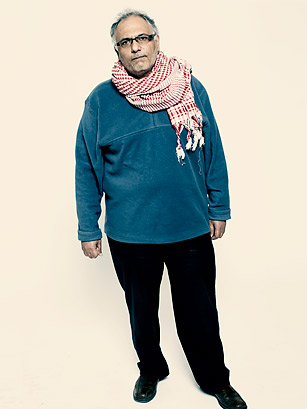
(2 of 2)
How did friends and family regard your participation in the protests?
There were many instances when I lost my job or important business because of being in the opposition [before the revolution], got arrested, things like that. I got defamed in the newspapers and things like that. So I was asked by many people to stop: "You're not going to do anything; you're just wasting your life. You're a parent, and you should be with your kids." My wife was quite supportive, and that's very strange because I thought she was quite the opposite of this. But my wife joined protests on Jan. 28 in Nasser City and on subsequent days in Tahrir.
Did you think the revolution and the protests were going to be successful?
Since the elections of 2010 it became very apparent that the recklessness of the regime in running the election in that way and getting 95%+ while the NDP was really hated. I thought that was the beginning of the end. And I remember even writing in my blog that the regime was a train heading into the terminal. We hadn't arrived. Of course it was only [after] Tunisia, when they started the revolution, we sent out support messages in December and so on. And as it gathered momentum, it became clear that this was like a user's manual in how to topple a regime peacefully. Since around the 16th of January, there was an opinion poll in [the newspaper] Masry al-Youm, and the public opinion was for revolution. The Internet at that time was huge. Twitter was small but purely for hardcore activists. While Facebook was for larger mobilization. I was not sure what would happen. But I kind of changed my business plans, canceled some meetings. I have a son who studies in Canada, so I transferred some money to Canada because I didn't know if I would be alive. I took it very seriously and made preparations, as in, What happens if I die?
What was the most frightening moment for you?
All the time. In the minutes of an attack, you feel you'll get crushed in a stampede. At one point, maybe around 5 or 4:30 on the first day, they started throwing tear gas really bad. And I and a small group started advancing in one line against the flow of the stampede. But then people came behind us. And so that was a bit scary. We tried to make a first line to get people back to the square. On the 28th, there was a genuine fear of chaos. I thought, "Oh my god, we've started something that could lead to chaos." Because we had already witnessed in Tunisia that the regime had released thugs and that neighborhood watches had [to be set up]. [But] we had a parallel state anyway, so it didn't matter if the formal state was toppled or failed because Egyptians were ready. Within the square, within 24 hours, there were hospitals. From the very first hours of Jan 25. So that kind of self-organization was amazing. And it was a moment of discovery that I think many people doubted. Many people say today, "You don't look so desperate after parliamentary results." But there is nothing worse than Jan. 28 in the evening, and I think I had the same fear around the 9th of February when many labor groups and separate governorates began to have separate uprisings. And I thought the country is slipping into chaos. And that was one of the reasons that from the very first moment, Egyptians were calling for the army to step in.
How did your participation in the revolution change you as a person?
Maybe things will go bad for a while, even three or five years. But I discovered things about people that I didn't know about. I think in a way it's comforting, that whatever happens, in the end, things will turn out all right. Because the relationship between people and authority in Egypt has changed forever. And that in itself is the guarantee, the guarantee that people themselves have discovered that they can change and stop authority from going too far. I think that self-discovery changes everything. So I can't say that I've been transformed as a person after the revolution. But I think I learned new things, became more confident in the future of Egypt.